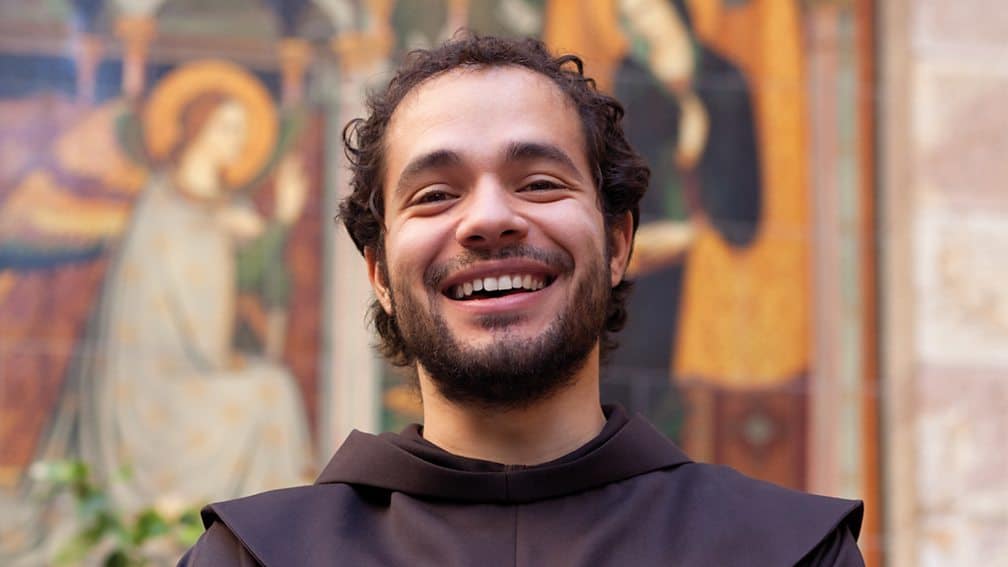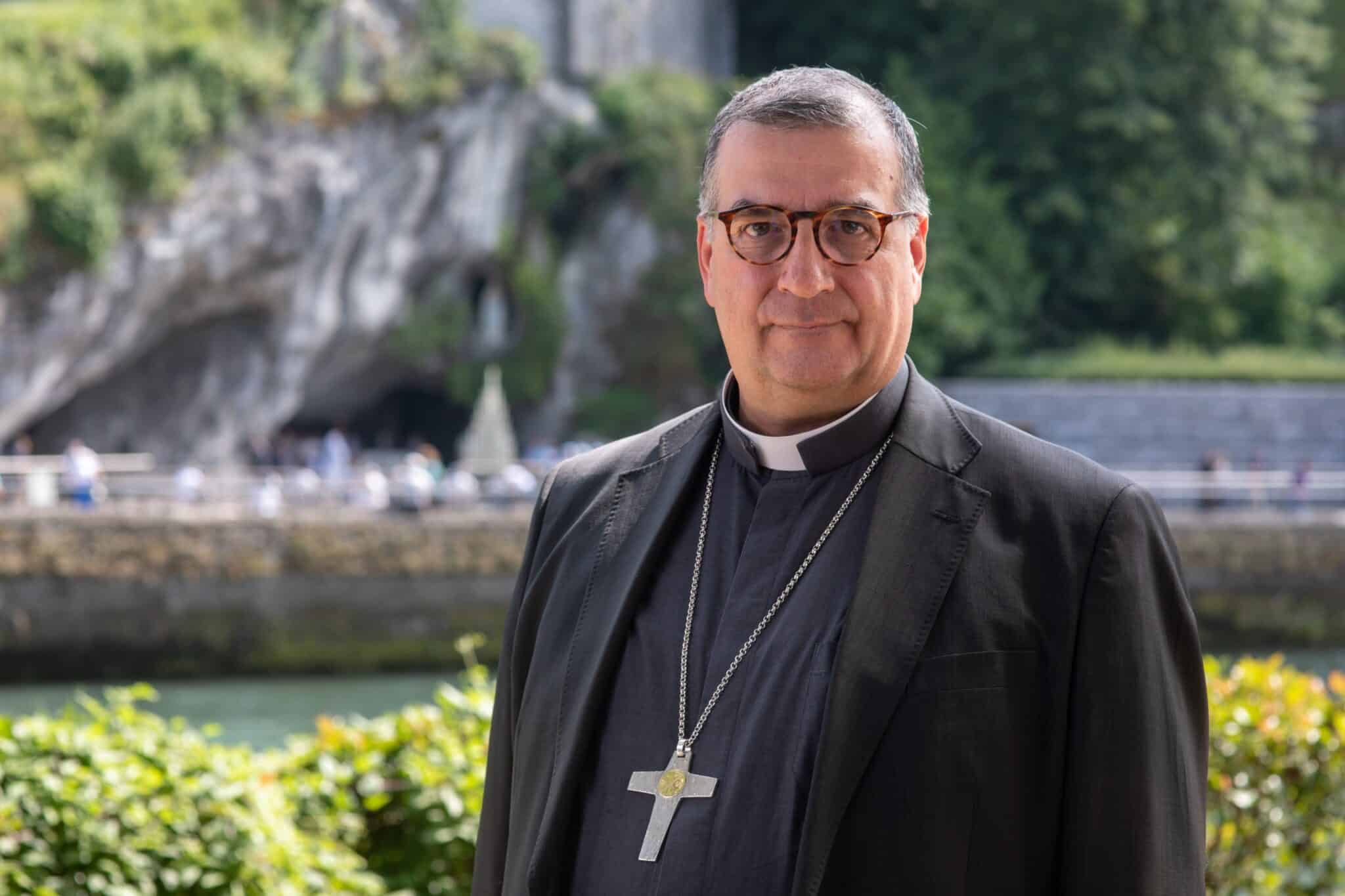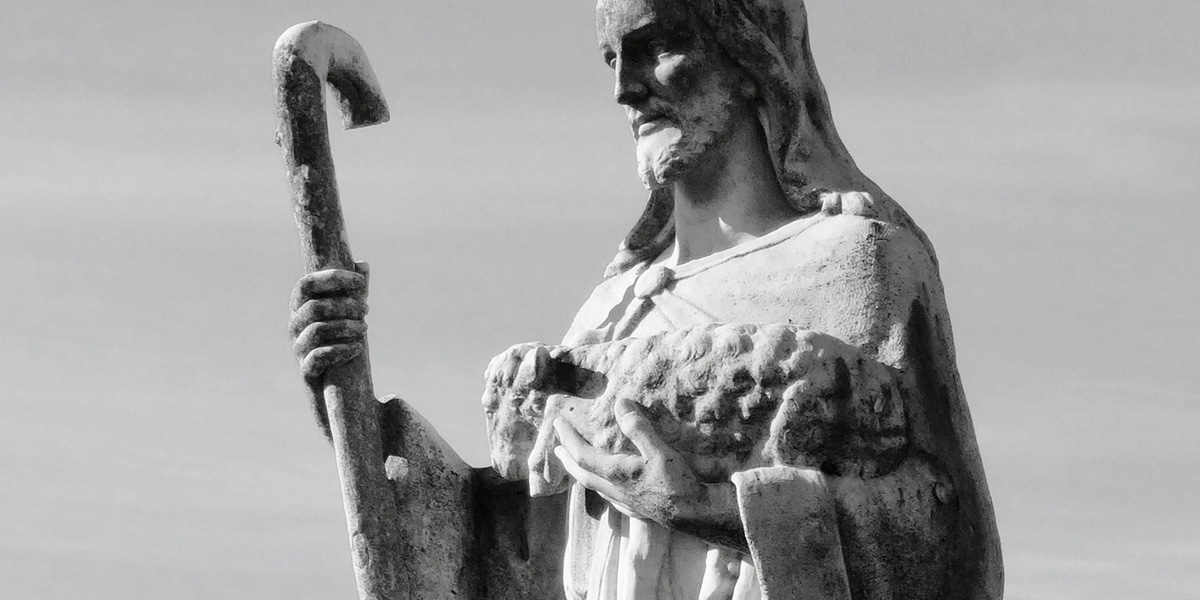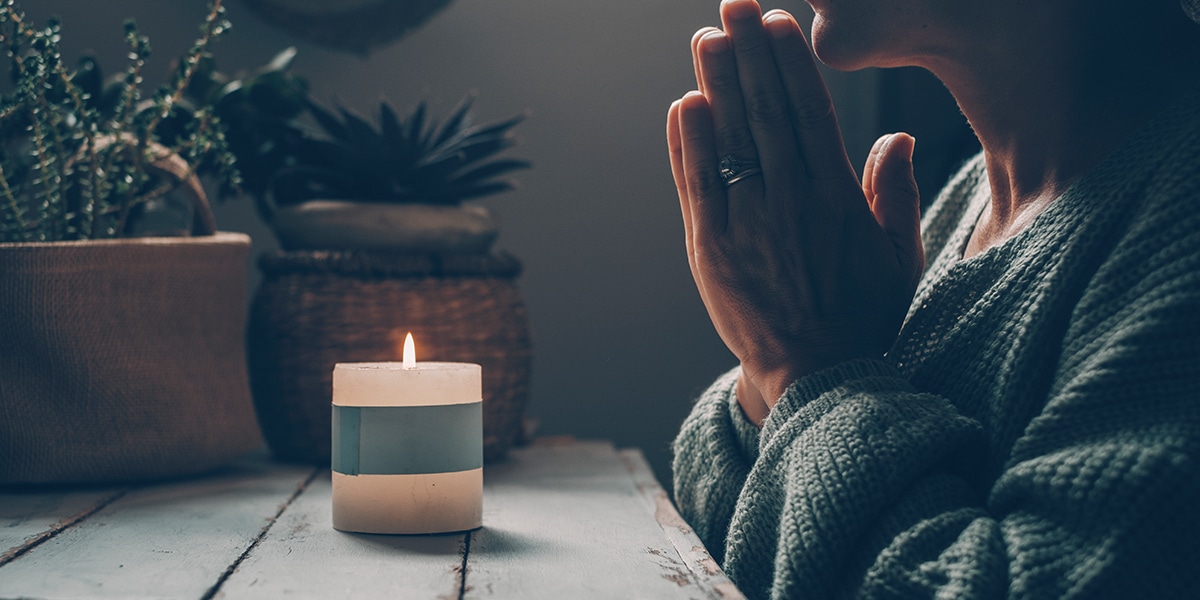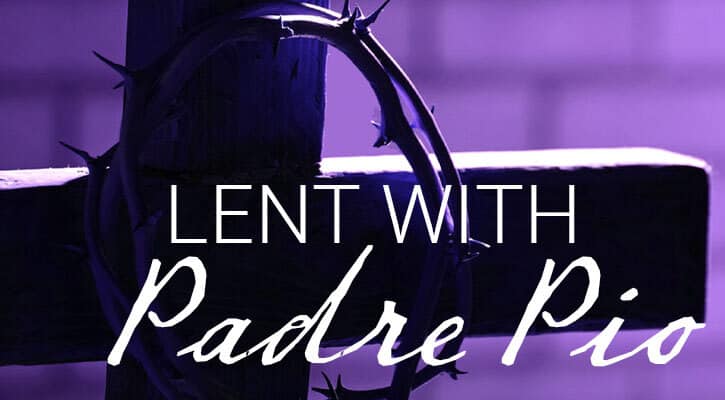This humble friar from Assisi has become a worldwide singing sensation.
I’m waiting beneath two stunning magnolia trees in the courtyard of the friary of Our Lady of the Angels, whose chapel, the Porziuncola the “Little Portion” Saint Francis restored with his own hands. Here, on the plain below Assisi, is where Saint Francis died. Here, Saint Clare was received into the order as the first Franciscan woman, and here, Friar Alessandro Brustenghi, the “Voice from Assisi,” lives and ministers.
I’m waiting to interview this new musical sensation. A 36-year-old Franciscan friar who, before his recording debut with Decca, worked as a relatively anonymous friar doing occasional carpentry, welcoming pilgrims from all over the world who visit this important Franciscan shrine every year.
His days also included playing the organ for the music of the liturgies, the daily prayers of the Divine Office, and other celebrations at the shrine. Suddenly the door of the friary opens and out bounds Friar Eunan McMullen, a friar of the Assisi Province of Franciscans and formerly a practicing barrister in Belfast.
“Alessandro will be late. He’s caught in traffic near Perugia. He’s been visiting his parents and family before embarking on his first album tour to Rome, Paris, and London. Let’s go to the friary snack room and wait for him.”
A cup of tea and a short wait later, Friar Alessandro arrives, out of breath and apologetic. He needn’t be. Friar Eunan has been filling me in on background material. The young friar before me looks much like the Saint Francis people usually imagine: relatively short, broad smile, curly black hair, and black eyes that seem to have a permanent twinkle. He enters our ongoing conversation and, though hassled and tired, happily answers my prepared questions, though I quickly discard them and just listen and talk with Friar Alessandro. As listening always does, it answered any questions I may have had and more.
Our time is limited. He has to play the organ for vespers. The prayer of the fraternity always comes first. But it was time enough to learn that Friar Alessandro was born and grew up in Castiglione della Valle, a small village 18 kilometers from Perugia, the region’s capital city.
A Conversion Story
Though Friar Alessandro is now in his late-30s, he looks and acts much younger, having been later born again, that is, when he was 16 years old. It happened one day near his home when he lay down in a field and asked God to come to him. Suddenly, the field and everything around him was suffused with a light that seemed to emanate from nature itself. It was alive, and he felt intimately connected to all of creation.
As he himself puts it: “I discovered the presence of God, a new presence, a different presence. Not just the feeling of goodness, but God as a person. I felt him close to me. He is in creation, in people. I felt him inside of me; I felt his love for all people. I felt that it is love that is important; and if Jesus gave himself, the only way for me to say thank you was to give myself as a consecrated person.”
That was the beginning of his conversion which led to the beginning of his vocation as a Franciscan friar. That vocation became clear when he saw a film about Saint Francis and learned that Francis himself, who lived 800 years before in the nearby town of Assisi, had had a similar experience.
Friar Alessandro went to a friary and inquired what he must do to become a friar, only to be told that he was to finish what he had begun. And that is what Alessandro proceeded to do in order to become Friar Alessandro: he continued and completed his studies in Perugia.
But that event, he told Italian chronicler Gianpaolo Masotti, “I touched with my hand and it changed my life forever.”
Learning the Fundamentals
With a rueful smile, Friar Alessandro tells me that his town of some 500 inhabitants is now one fewer since his departure to live with the friars. It is evident how much Alessandro loves his town and his family and the small house where he and his sister, his parents, and his four grandparents lived when he was growing up.
“Eight people,” he says, “within 90 square meters, a space that taught me to know and reverence the difference between youth and old age, the importance of moderating my own needs to respect the needs of others, and to appreciate the small daily triumphs of learning to love.”
He excitedly relates how at a young age he was fascinated by the organ and by organ music, and how, at age 9, with his parents’ encouragement, he began to study in earnest. He studied piano first, and then switched to the pipe organ at the Morlacchi Conservatory in Perugia, having already studied informally for two years with his uncle.
His uncle was a demanding teacher who for those two years wouldn’t allow Alessandro to touch an instrument until he’d mastered the practice of sight-reading music, and singing the notes and their intervals correctly. “What a trial for a little boy!” Friar Alessandro readily admits.
But that insistence on learning the fundamentals became the best foundation for his life as a musician and as a friar. Everything must start with a firm foundation, even his life as an international singing star who, one might think, leads a high-flying lifestyle as he jets to Rome, London, Paris, and wherever his concert tours may take him.
His Greatest Lesson
As an organ student, Friar Alessandro became quite the expert, and quite a little show-off in the way he’d play with a flourish of the hands and shake of the head, especially at the climax of a passage and at the end of a piece.
Then one day, when he felt quite proud of himself playing for his organ and composition teacher, Wijnand Van de Pol, he finished with a particularly grand flourish. His maestro said, “And what was that little display all about?” Abashed, Alessandro said, “Well, I’ve been watching and being inspired by the great organists and how they play for effect.”
“Oh, have you? Well, it’s evident, then, that you’ve learned little about what it means to be an organist. It’s not about you! It’s about the music. Don’t waste your time learning to play music until you’ve learned to be humble and reverent before the music that you are channeling.”
This, Friar Alessandro says, is the greatest lesson he learned from the man he calls his true musical master. It’s not just about technique and mechanical expertise; it’s about humbly entering into the mystery and beauty of the music itself.
Finding His Voice
Friar Alessandro says that he had two great teachers: Van de Pol and Gabriella Rossi, who asked him one day to sing for her. She felt he had a voice somewhere inside him, but at the moment it was a small, weak voice. Would he consider studying voice with her?
The move would mean his voice would need to be found and trained, which would also mean switching majors in the midst of his studies, from organ to voice, from Van de Pol to Rossi. All of this Alessandro finally did with sadness in leaving Van de Pol, who ended up giving his blessing to the move.
It took two years of agonizing work and worry that he wouldn’t graduate because his voice continued to be trapped somewhere inside him. Then one day, at the very end of his studies, in an experience not unlike that of his conversion, his voice suddenly broke forth in a rich tenor that surprised him with a new sound coming, it seemed, from his diaphragm and not just from his vocal cords.
“I found my voice,” Friar Alessandro says. “I passed the exam with distinction. I began to love opera. I met a friar who introduced me to the voices of the great tenors. I joined the order and, when I was a postulant, I told my spiritual director that I would now stop singing. I just want to be a friar to work and pray with the others.’ But my director said, ‘No, you will continue. It is a talent from God; you can’t refuse it.’
“So I continued to sing, even doing concerts. Then my director said, ‘Now you are going to stop singing.’ At first it was hard, but then I felt a new strength, because I discovered that the music was still there inside of me. God’s gift was in my heart. When I woke up in the morning, in my heart I heard melodies.
“This had been a test, and when my director saw that I was at peace with this sacrifice, he told me that in two months I could continue singing in public again. I then made my first profession of vows and began to prepare for final profession.” Except there was a glitch.
Years of Discernment
“Just then I had a vocational crisis,” explains Alessandro matter-of-factly. “I no longer believed in my vocation as a friar. It’s a mystery to me why.”
After much discussion with his director, Alessandro took a leave of absence from the friars. “I decided, like Saint. Francis, to live like a hermit, in solitude. I continued singing, though, and woodworking and restoring musical instruments. They were three long, torturous years. I would sing every day and weep every day, and the years felt like a self-punishment. But though the journey was not easy, I finally felt I had to be a friar. And I knew I could both sing and be a friar, so I re-entered the order and made my final vows in 2009.”
A Turn toward Fame
Today music and fraternal life with his brothers occupy Friar Alessandro’s days within his Franciscan fraternity, where he still plays the organ but now also practices singing for hours during the week. He also gives an occasional solo singing concert.
It was after one evening of such a concert in Perugia that something momentous happened. He was told that an English gentleman would like to speak with him. Another new birth was about to take place.
The Englishman, it turned out, was Mark Pinder, the agent of the legendary audio producer/engineer Mike Hedges, whose work was nominated four successive years at the Grammys. The man who’d discovered the Priests, a singing trio of priests from Northern Ireland. The man who had worked as part of the musical team for the film Harry Potter and the Goblet of Fire, and the man whose credits include the Cure, U2, Dido, the Undertones, Main Street Preachers, Travis, Texas, and the Beautiful South. And now, through Mark Pinder, he was about to discover the “Voice from Assisi,” the young Franciscan, Friar Alessandro Brustenghi.
Pinder asked Friar Alessandro if he would be willing to sing in Assisi before a panel of experts from Decca Recordings, stunning the young friar, who was both surprised and excited. He knew he could not make that decision on his own.
The decision would have to come from his Franciscan brothers, which in the end, it did. His superiors acquiesced and said that if only one person was converted by Alessandro’s voice, then it would be good and worthwhile.
The concert in Assisi led to the panel inviting Friar Alessandro to London to be introduced as their new recording artist before Decca representatives from 25 countries gathered there for the 2012 International Decca Conference in Westminster. Again, Friar Alessandro was given the permission, which led to recording Voice from Assisi, a CD that rose to the top of the charts in the Christian and Gospel category for 2012.
The CD was recorded at the famed Abbey Road Studios where, in 1963, the Beatles recorded Please Please Me, their first album, the album that launched their career, just as Friar Alessandro’s first album made him an international star much to the surprise of the friar and his brothers and the small town of Castiglione della Valle.
Sharing the Gospel
But from the very beginning his superiors saw the dangers in what they were giving permission for. So when Decca offered to provide an agent for Friar Alessandro, they said no. Friar Alessandro has a friar as his companion wherever he goes, and they must always stay in a friary, not a hotel, when they travel.
They chose as Friar Alessandro’s companion Friar Eunan, who, as a lawyer, has the expertise necessary to study contracts and the steady hand to be a good companion, guide, secretary, and point man for Friar Alessandro’s dealings with Decca, the press, and his fans.
Friar Eunan tells me that their ministry is to transmit the Christian message in how they relate to one another and others, and to also transmit the Franciscan message, and preserve fraternity with their brothers at the Porziuncola, who look after their chores when they are on the road.
When they are not on the road, they are to enter into the life of the fraternity and its ministries. And because of Friar Alessandro’s vow of poverty, all profits from concerts and royalties go to fund the Franciscans’ charitable initiatives and ministries.
The Franciscan lifestyle, then, and the daily schedule of prayer and work at the friary, are what Friar Alessandro continues to embrace. He continues extra hours of voice exercises as he prepares, at the time of our interview, for the CD Voice of Joy, which was released in the fall of 2013.
But these practices are not solely about voice exercise. Friar Alessandro’s is not just a voice as a natural gift or a cultivated, trained instrument, though it is both of these. Rather, his voice strives to be an instrument of the peace and joy of saying yes to God and all of God’s creatures, calling them, as did his father Saint Francis, his brothers and sisters.
“Twenty years have passed” since his profound conversion, Alessandro told chronicler Masotti. “Finally, I am no longer focused so much on myself. . . . I live in a world that is not my work, but a gift of the love of God.”
It is this spirit, the spirit within him and within the Franciscan fraternity out of which he sings, that makes Friar Alessandro’s voice different and distinctive.


